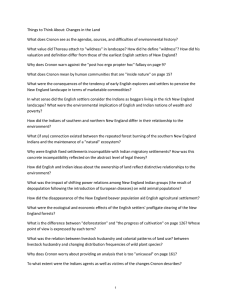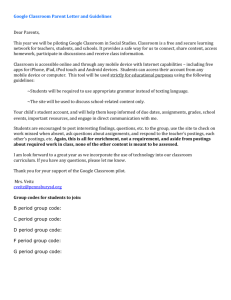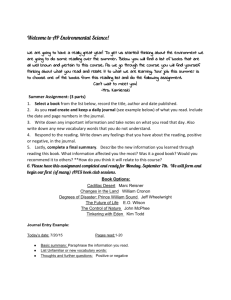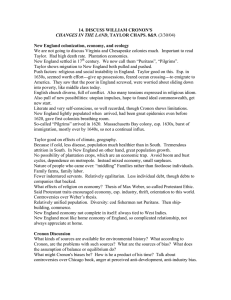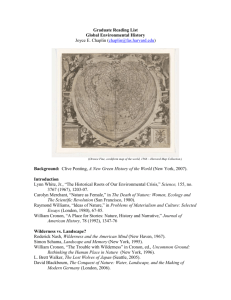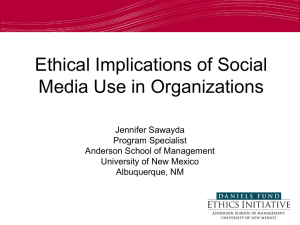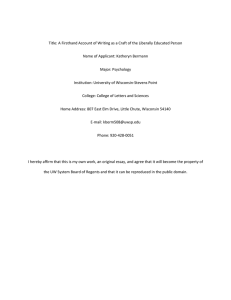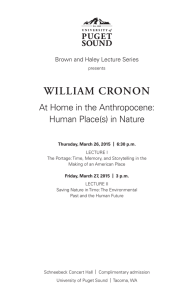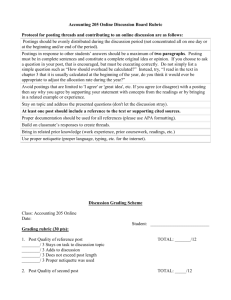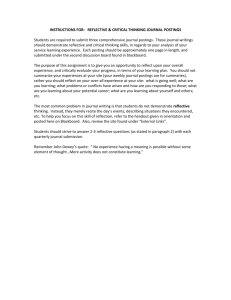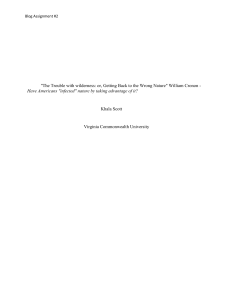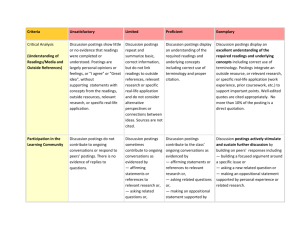syllabus_-_history_74f_
advertisement
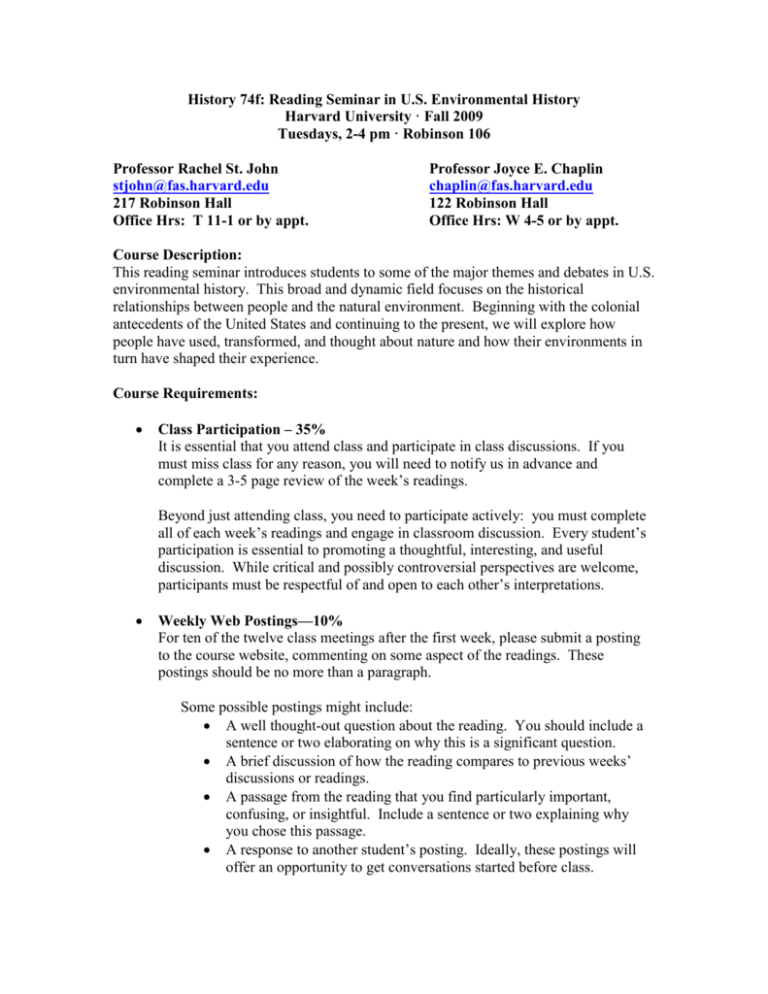
History 74f: Reading Seminar in U.S. Environmental History Harvard University · Fall 2009 Tuesdays, 2-4 pm · Robinson 106 Professor Rachel St. John stjohn@fas.harvard.edu 217 Robinson Hall Office Hrs: T 11-1 or by appt. Professor Joyce E. Chaplin chaplin@fas.harvard.edu 122 Robinson Hall Office Hrs: W 4-5 or by appt. Course Description: This reading seminar introduces students to some of the major themes and debates in U.S. environmental history. This broad and dynamic field focuses on the historical relationships between people and the natural environment. Beginning with the colonial antecedents of the United States and continuing to the present, we will explore how people have used, transformed, and thought about nature and how their environments in turn have shaped their experience. Course Requirements: Class Participation – 35% It is essential that you attend class and participate in class discussions. If you must miss class for any reason, you will need to notify us in advance and complete a 3-5 page review of the week’s readings. Beyond just attending class, you need to participate actively: you must complete all of each week’s readings and engage in classroom discussion. Every student’s participation is essential to promoting a thoughtful, interesting, and useful discussion. While critical and possibly controversial perspectives are welcome, participants must be respectful of and open to each other’s interpretations. Weekly Web Postings—10% For ten of the twelve class meetings after the first week, please submit a posting to the course website, commenting on some aspect of the readings. These postings should be no more than a paragraph. Some possible postings might include: A well thought-out question about the reading. You should include a sentence or two elaborating on why this is a significant question. A brief discussion of how the reading compares to previous weeks’ discussions or readings. A passage from the reading that you find particularly important, confusing, or insightful. Include a sentence or two explaining why you chose this passage. A response to another student’s posting. Ideally, these postings will offer an opportunity to get conversations started before class. There are many other possibilities for postings. The point is to get you thinking critically about the reading before arriving in class. These postings are not expected to be polished or brilliant, but should indicate that you’ve read and thought about the material. Postings should be sent to the class no later than 9 am each Tuesday, so that everyone can look them over before class. Primary source analysis, 2-3 pages – 15% For one class, find a relevant primary source (something written during the period of time in question) and write a brief analysis of it. Did the authors we read for this week take this source (or something like it) into account? If they did not, would it have changed their argument(s) if they had? Note: for the week you do this exercise, you do not need to post a response on the course website other than a one-paragraph summary of your source and analysis of it. Book Review, 400 words/2 pages, Oct. 13 – 15% Select one of the monographs from the first six weeks of class and write a critical review. To prepare for this assignment you should consult the book reviews in Environmental History, the preeminent journal in the field. Using these reviews as models, write a 400-word (2 page) review of the book in which you summarize its approach and argument and critically evaluate its contribution to the field of U.S. environmental history. Historiographic or research essay, 10-12 pages, due by 5 pm, Dec. 12 -- 25% Course Texts (available at COOP or Lamont reserves): Thomas G. Andrews, Killing for Coal: America’s Deadliest Labor War Rachel Carson, Silent Spring William Cronon, Changes in the Land: Indians, Colonists, and the Ecology of New England Alfred W. Crosby, The Columbian Exchange: Biological and Cultural Consequences of 1492 Andrew Hurley, Environmental Inequalities: Class, Race, and Industrial Pollution in Gary, Indiana, 1945-1980 John Krakauer, Into the Wild Helen Rozwadowski, Fathoming the Ocean: The Discovery and Exploration of the Deep Sea Conevery Bolton Valencius, The Health of the Country: How American Settlers Understood Themselves and Their Land Elliott West, The Contested Plains: Indians, Goldseekers, and the Rush to Colorado Richard White, The Organic Machine: The Remaking of the Columbia River Schedule Sept. 8: Introduction: What is environmental history? What is American about it? Sept. 15: Before and after 1492 Alfred W. Crosby, The Columbian Exchange: Biological and Cultural Consequences of 1492 Shepard Krech III, The Ecological Indian: Myth and History, 15-44. Sept. 22: Colonial Encounters William Cronon, Changes in the Land: Indians, Colonists, and the Ecology of New England Richard H. Grove, Green Imperialism: Colonial Expansion, Tropical Island Edens, and the Origins of Environmentalism, 1600-1860, 16-72. Sept. 29: Re-settling a Continent Conevery Bolton Valencius, The Health of the Country: How American Settlers Understood Themselves and Their Land Alan Taylor, “ ‘Wasty Ways:’ Stories of American Settlement,” Environmental History, 3 (1998), 291-310 Oct. 6: Contested Landscapes Elliott West, The Contested Plains: Indians, Goldseekers, and the Rush to Colorado We will view clips from Christopher McLeod, dir., In the Light of Reverence (2001), in class. Oct. 13: Food and the Environment William Cronon, Nature’s Metropolis: Chicago and the Great West, chs. 3, 5. John Soluri, “Accounting for Taste: Export Bananas, Mass Markets, and Panama Disease,” Environmental History, 7 (2002), 386-410. BOOK REVIEW DUE Oct. 20: Water and Power Richard White, The Organic Machine: The Remaking of the Columbia River Donald Worster, “Hydraulic Society in California: An Ecological Interpretation,” Agricultural History, 56 (1982), 503-15 Roman Polanski, dir., Chinatown (1974). Oct. 27: Labor and Energy Thomas G. Andrews, Killing for Coal: America’s Deadliest Labor War Richard White, “Are You an Environmentalist or Do You Work for a Living?” in William Cronon, ed., Uncommon Ground: Rethinking the Human Place in Nature Nov. 3: The Sea around Us Helen Rozwadowski, Fathoming the Ocean: The Discovery and Exploration of the Deep Sea W. Jeffrey Bolster, “Putting the Ocean in Atlantic History: Maritime Communities and Marine Ecology in the Northwest Atlantic, 1500–1800,” American Historical Review, 113 (Feb. 2008), 19–47. Nov. 10: Wilderness? John Krakauer, Into the Wild William Cronon, “The Trouble with Wilderness” in William Cronon, ed., Uncommon Ground: Rethinking the Human Place in Nature We will view clips from Sean Penn, dir., Into the Wild (2007), in class. Nov. 17: Justice and Inequality Andrew Hurley, Environmental Inequalities: Class, Race, and Industrial Pollution in Gary, Indiana, 1945-1980 Dianne D. Glave, "‘A Garden So Brilliant with Colors, So Original in Its Design’: Rural African American Women, Gardening, Progressive Reform, and the Foundation of an African American Environmental Perspective," Environmental History 8 (2003), 395-411. Nov. 24: Conservation Rachel Carson, Silent Spring Maril Hazlett, "‘Woman vs. Man vs. Bugs’: Gender and Popular Ecology in Early Reactions to Silent Spring," Environmental History, 9 (2004), 701-29. Andrew Kirk, "Appropriating Technology: The Whole Earth Catalog and Counterculture Environmental Politics," Environmental History, 6 (2001), 37494. Dec. 1: Forward/Back Alan Weisman, “Earth without People,” Discover (Feb. 2005). http://themannahattaproject.org Final Essay Due: 5:00 pm, Dec. 12.
